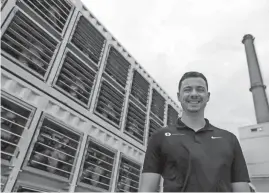Bitcoin mining is rapidly expanding across Iowa, driven by the state’s inexpensive electricity, abundant renewable energy, and favorable infrastructure. What was once a niche industry has now taken root in the heartland, with thousands of high-powered computers dedicated to solving the complex cryptographic puzzles that generate the digital currency.
One key player in this rise is Simple Mining, a Cedar Falls-based company founded by 28-year-old CEO Adam Haynes. At their Cedar Falls Utilities plant, 6,400 computers run nonstop, churning through the energy-intensive process of mining Bitcoin. Simple Mining operates around 10,000 computers across Iowa, consuming enough electricity to power approximately 26,000 homes.
Elsewhere in the state, Vinanz Limited, a publicly listed British cryptocurrency company, has begun operations near the tiny town of St. Anthony, Iowa. Partnering with MiningStore, a company that already has an established presence in the region, Vinanz joins the growing number of cryptocurrency miners drawn to Iowa’s low-cost power and favorable business environment.
Cryptocurrency mining operations, often classified as data centers, have found Iowa particularly attractive for reasons similar to those that brought tech giants like Google, Microsoft, and Meta to the state: affordable land, reliable internet, and a relatively moderate climate. In addition, around 60% of Iowa’s electricity comes from renewable sources, a factor that aligns with the global push toward more sustainable practices in tech industries.
However, the state’s Economic Development Authority has not offered financial incentives for cryptocurrency mining operations, a stark contrast to the millions of dollars in tax breaks given to larger tech companies. Some view the influx of cryptocurrency miners with concern, questioning their long-term value to rural communities.
The operations face challenges beyond financial incentives. Thousands of computers running simultaneously create significant noise pollution, a frequent complaint in areas close to mining sites. In Arkansas, lawmakers recently introduced measures requiring cryptocurrency operations to meet local sound restrictions and maintain a quarter-mile distance from nearby homes.
In Iowa, environmentalists have raised concerns about the enormous energy consumption associated with mining Bitcoin, which could lead to an increase in greenhouse gas emissions. Although much of Iowa’s electricity comes from renewable sources, the heavy demand for power by mining operations puts additional strain on the grid, potentially undermining efforts to combat climate change.
In one instance, the MiningStore company sought to establish operations in northwest Iowa, but local opposition blocked the proposal. Despite offering to invest $900,000 in noise reduction systems, the county board of adjustment denied the necessary permit due to concerns over noise and environmental impact.
For his part, Adam Haynes, CEO of Simple Mining, says his company aims to avoid these issues by selecting sites where noise won’t be a concern. He also emphasizes the economic benefits of mining operations, arguing that they help sustain utility infrastructure and keep electricity prices low in rural areas with declining populations. “That helps keep electricity costs lower for everybody,” Haynes explains, adding that Simple Mining has created around 50 jobs and primarily partners with municipal-owned utilities and rural electric cooperatives, which reinvest profits into local communities.
The economics of Bitcoin mining are highly dependent on energy costs. “Crypto mining operations essentially take energy and turn it into money,” explains Line Roald, an associate professor at the University of Wisconsin-Madison. For miners, electricity costs must be low enough to ensure a profit, making Iowa’s energy pricing particularly attractive. According to 2022 data from the U.S. Energy Information Administration, Iowa boasts the eighth-lowest electricity costs in the country.
As the cryptocurrency industry grows, so too does its demand for energy. A Goldman Sachs Research report projects that energy consumption by U.S. data centers, including cryptocurrency mining operations, could increase by 160% by 2030, further intensifying debates over the environmental and social impact of the sector.
Iowa, with its low electricity costs and established infrastructure, seems poised to remain a hub for cryptocurrency mining. However, as the industry continues to expand, balancing economic benefits with environmental and community concerns will become increasingly critical.

